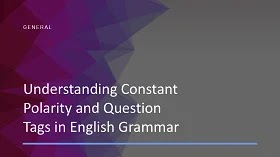Constant Polarity in English Grammar
Constant polarity refers to the use of question tags that maintain the same polarity (affirmative or negative) as the main clause. While less common, it is a fascinating aspect of English grammar, particularly in British English.
Affirmative Polarity
Constant affirmative polarity is not the norm but is still considered acceptable and occurs with some frequency. These question tags are used to seek confirmation of a statement whose truth is assumed, especially when spoken with falling intonation.
- "Anyway, you’re letting them go, are you?" (Barnard, 1977, p. 132)
- "You put your heart into it, did you?" (Mann, 1985, p. 165)
- "They do, do they?" (Rowling, 2003, p. 441)
- "You think that, do you?" (Bingham, 1985, pp. 69–70)
- "This is your flat, is it, Miss Sutton?" (Hart, 1987, p. 129)
- "There’s going to be a divorce, then, is there?" (Raphael, 1976, p. 136)
- "That was the same pilot, was it?" (Shute, 1940, p. 215)
- "You’d say that, would you?" (Bingham, 1985, p. 48)
Negative Polarity
Constant negative polarity is rarer and often disputed. It has been reported in British English, though its usage is marginal and often exceptional. Examples include nonstandard dialect use and heavily ironic constructions.
- "You’re not going, aren’t you?" (O’Connor, 1955, p. 102)
- "He hasn’t tried, hasn’t he?" (F. R. Palmer, 1968, p. 41)
- "He wouldnae do it, wouldn’t he no?" (Scots dialect, Millar and Brown, 1979, p. 30)
- "You can’t do it, can’t you not?" (Tyneside Geordie dialect, Burton-Roberts, 1986, p. 243)
- "I can’t, can’t I?" (Jespersen, 1940, p. 496, heavily ironic)
- "He can’t ’arf sup ale, can’t he?" (nonstandard dialect use, Ebdon, 1985, p. 139)
- "He is’n’ rabid ent ’e?" (stunt use, Sunday Telegraph, 1988)
- "Kylie is unlikely to be worth that much, isn’t she?" (negative prefix un-, Jones, 1995, p. 88)
- "You oughtn’t to say that now, oughtn’t you?" (rare use of interrogative oughtn’t, Snow, 1979, p. 189)
Key Observations:
- Affirmative polarity question tags are more common and are used to confirm assumed truths.
- Negative polarity question tagss are rare, often dialectal, and typically carry ironic or emphatic meanings.
- Both types of constant polarity highlight the flexibility and regional diversity of English grammar.
Why This Matters: Understanding constant polarity helps learners grasp the nuances of English question tags, particularly in British English. It also sheds light on regional dialects and the expressive potential of grammar.








